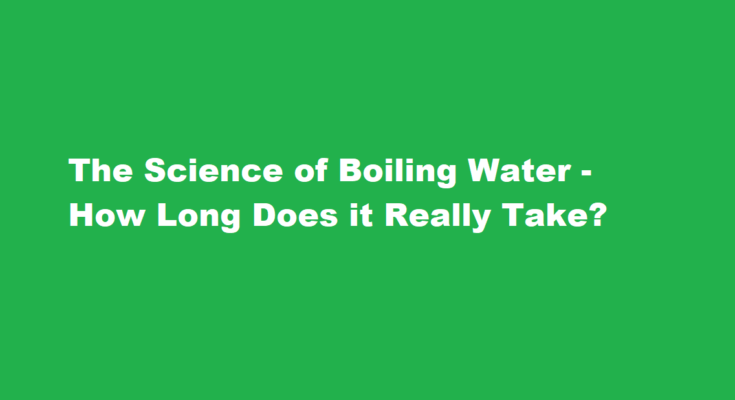Introduction
Boiling water is a fundamental process in our daily lives, often taken for granted. We rely on it for cooking, making hot beverages, and sterilizing items. But have you ever wondered exactly how long it takes for water to boil? The answer may seem simple, but when we delve into the science behind this common occurrence, we uncover a fascinating world of variables and intricacies that affect the boiling time. In this article, we will explore the factors that influence the time it takes for water to reach its boiling point.
The Basics of Boiling
To understand how long it takes for water to boil, we must first grasp the fundamental principles involved. Boiling occurs when a liquid turns into vapor by absorbing enough heat energy. In the case of water, this happens when its temperature reaches 100 degrees Celsius (212 degrees Fahrenheit) at sea level and under standard atmospheric pressure.
Factors Affecting Boiling Time
Several key factors influence how long it takes for water to reach its boiling point
- Altitude Altitude, or elevation above sea level, has a significant impact on boiling time. As you go higher in altitude, the atmospheric pressure decreases, which, in turn, reduces the boiling point of water. For example, at an elevation of 1,000 meters (3,280 feet), water will boil at around 90 degrees Celsius (194 degrees Fahrenheit). At higher altitudes, the boiling point continues to decrease, requiring less time to reach the boiling point.
- Pot Material and Size The material and size of the pot used can affect the time it takes for water to boil. Metals like copper and aluminum conduct heat efficiently and can speed up the boiling process. A larger pot will generally take longer to boil water than a smaller one, as it requires more energy to heat the larger volume of water.
- Heating Source The type of heating source plays a crucial role in boiling time. Gas stoves tend to heat up faster than electric stoves because they transfer heat directly to the pot. Induction cooktops are also known for their rapid heating capabilities. In contrast, electric coil stoves may take longer due to the indirect heat transfer.
- Water Temperature The initial temperature of the water can impact the boiling time. Cold water takes longer to boil than water that is already at a higher temperature. This is because it requires more energy to raise the temperature of cold water to the boiling point.
- Covering the Pot Using a lid to cover the pot can significantly reduce boiling time. The lid traps heat, preventing it from escaping and ensuring that more of the heat energy is transferred to the water. This simple trick can save both time and energy.
- Stirring Agitating the water by stirring it can distribute heat more evenly throughout the liquid, speeding up the boiling process.
- Impurities The presence of impurities or dissolved substances in water, such as salt, can elevate its boiling point slightly. This means that salty water may take a bit longer to boil than pure water.
Practical Examples
Let’s consider a couple of practical scenarios to illustrate how these factors can affect the time it takes for water to boil
- Boiling water in the mountains If you’re camping in the mountains at an elevation of 2,000 meters (6,561 feet), the reduced atmospheric pressure means that water will boil at around 90 degrees Celsius (194 degrees Fahrenheit). It will reach its boiling point faster than it would at sea level.
- Boiling water in a small aluminum pot with a lid Using a small aluminum pot on a gas stove with a lid will result in a relatively quick boiling time. The efficient heat transfer of the metal and the heat retention from the lid will expedite the process.
FREQUENTLY ASKED QUESTIONS
Why does water take so long to boil?
Liquid water has an especially high heat capacity, 4184 J/Kg K. Compare this to something like copper, with a specific heat capacity of 385J/Kg K. This means copper takes less time to heat up than water and cools down quicker, no wonder it’s so useful for pans!
Why is water harder to boil?
Soft water will boil faster than hard water, the reason being that hard water contains dissolved minerals which elevate its boiling point. Hard water is so named due to a couple of reasons, a major one being that it contains lots of hard minerals, like calcium and magnesium, and it doesn’t lather easily with soap.
Conclusion
In conclusion, the time it takes for water to boil is influenced by a combination of factors, including altitude, pot material and size, heating source, initial water temperature, covering the pot, stirring, and the presence of impurities. Understanding these factors can help you optimize your boiling process for efficiency and convenience.
While we often take boiling water for granted, it is a simple yet profound example of the principles of thermodynamics and the impact of environmental variables on everyday tasks. Whether you’re preparing a cup of tea at sea level or cooking at high altitudes, knowing the science behind boiling water can enhance your culinary experience and appreciation for the physical world around us.
Read Also : Perfectly Baked Chicken Wings – Mastering the 400°F Technique



